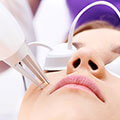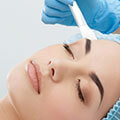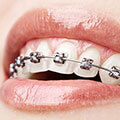
PCOS
PCOS, stands for "Polycystic Ovary Syndrome", is a hormonal disorder among women which affects them during their reproductive age i.e. between the ages of 15 to 44 years approx. During this period many women have PCOS but they aren't aware about it. PCOS affects the reproductive organs of a woman which is a woman's ovaries that produce estrogen and progesterone hormones that are liable to regulate menstrual cycle. But a woman with PCOS has elevated androgens (a male hormone; also produced by ovaries) that causes her some abnormalities with the reproductive system.
Symptoms of PCOS include; irregular or no menstrual periods or heavy periods, worsening hirsutism (excessive body and facial hair growth), male pattern baldness, severe acne, heavy bleeding, obesity (excessive weight gain), dark & thick patches on the neck, under the breast and in the groin.
What Causes "PCOS"?
There are many reasons that cause PCOS and affect the reproductive organs of a woman in various ways. The main cause is the excessive production of androgen, the male hormone that prevents ovaries from producing reproductive hormones and eggs but results in severe acne and hirsutism. More oftenly PCOS runs in families through genes as a genetic disorder.
In most cases of PCOS, affected women's cells become resistant to use insulin (a hormone produced by pancreas which allows your cells to use sugar) properly, in this way your body sugar level can rise and you may have excessive production of insulin. Excessive production of insulin may result with increased androgen production and can cause you obesity that increases the risk of type 2 diabetes.
Women with PCOS have been found with the low level inflammation that provokes their reproductive organ to produce more androgen and can also lead to heart and blood vessel conditions.
Diagnosis Of "PCOS" :
Your diagnosis starts with the conversation of your family' history with the disease, your medical history, menstrual cycle and weight gain or loss which further includes a physical examination to check acne, body and facial hair growth. Doctor may recommend to diagnose the disease properly :
Blood test to check your insulin level, cholesterol level and male hormone levels that affect your reproductive organs.
Pelvic ultrasound imaging is considered to be a major diagnostic tool to check your ovaries and uterus.
Treatment Of "PCOS" :
Treatment of PCOS is held with considering these goals; regular menstruation restoration, restoration of fertility, lowering of insulin resistance level and hirsutism or acne treatment. But the primary treatment process of PCOS include; lifestyle change and medication.
Lifestyle change : This includes your diet and daily exercise to overcome obesity. Low calorie diet with daily moderate exercise is recommended by the doctor to overcome obesity. Weight loss can help improve your condition. Also losing your weight can help to restore your fertility and increase the effectiveness of your medication.
Medication : To restore your fertility and regulate your menstrual cycle your doctor prescribes you these medications:
Birth control pills (contain estrogen and progestin) help to regulate menstrual cycle, restore your normal hormone balance and reduce excessive hair growth.
Clomiphene drugs that contain anti- estrogen can help to restore fertility.
Metformin, a drug that is used in the treatment of type 2 diabetes also helps to improve insulin level and weight loss.
Moreover, to reduce extensive hair growth your doctor may prescribe: Eflornithine (Vaniqa: with cream base); to slow facial hair growth, Spironolactone (Aldactone) and Electrolysis.
Subscribe to our
Newsletter
***We Promise, no spam!



